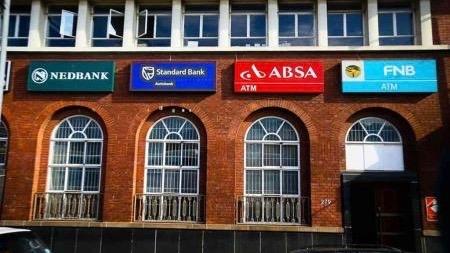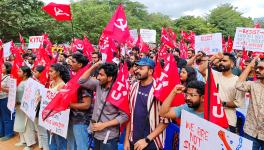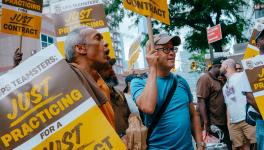South African Labor Court Interdicts Country-wide Strike by Bank Officials

Ruling in favour of Business Unity South Africa (BUSA), a federation representing the interests of private businesses, a labour court interdicted a strike action by the country’s largest finance sector union, the South African Society of Bank Officials (SASBO), which was to take place on September 27-28.
73,000 members strong, SABSO is affiliated to the ruling ANC’s ally, the Congress of South African Trade Unions (COSATU). The countrywide strike was called for to protest the mass lay-offs in the banking sector.
The strike was called amid high uncertainty in the banking sector. Standard Bank is already in the process of shutting down 91 of its branches across the country. Restructuring of operations by Absa Group Ltd across the country is also underway. According to a Bloomberg report, Nedbank has also begun talks with over 1500 employees, out of which at least 50 to 100 will not be redeployed and are bound to lose their jobs.
SASBO general secretary Joe Kokel maintains that the real numbers are much higher, and 3,000 Nedbank employees, 6,000 Standard Bank employees and 878 Absa employees are at the risk of losing jobs by the end of this year. “If finance employees fail to make a stand now, by the end of the year 10,000 jobs in the financial sector could be lost,” Kokel had warned.
However, one day before the strike was set to begin, the industrial action was halted by the court after hearing an urgent application filed by BUSA. BUSA’s advocate argued that the union did not comply with all the procedures prescribed in section 77 of the Labour Relations Act. This section states the conditions under which workers who undertake strike action must be protected from dismissals or penalties.
As per the section, a strike will be protected if “NEDLAC or any other appropriate forum in which the parties concerned are able to participate in order to resolve the matter” is notified first by a registered trade union or federation of trade unions. After considering the matter, if NEDLAC determines a deadlock, it can issue a certificate making way for the union to notify of ‘protest action”, which includes strike.
Such a certificate was given to COSATU by the National Economic Development and Labour Council (NEDLAC) in August 2017, after it determined that the government and business were showing no intention to engage with COSATU over its demand for prohibition on retrenchments for profit maximization by private companies.
BUSA’s advocate argued that this certificate from 2017 cannot be used now. Apart from the fact that this dispute over retrenchments by private companies is unresolved and continues to remain, COSATU’s advocate also argued that the certificate is “legally” valid in 2019. Backing his argument, he cited that another protest action this year, for which section 77 notice was filed two years ago, was treated as protected.
The judge ruled in favour of BUSA, and, according to the Sunday Times, “will give reasons at a later date.” With a court ruling against it, a strike action tomorrow will be ‘unprotected’, which means the employees downing tools can be charged with heavy penalties or even dismissed.
Insisting that the “financial Strike.. organized by SASBO and COSATU” has only been “postponed and not cancelled,” COSATU said in a statement:
“We totally disagree with the court’s decision but we respect our judicial system so we will abide by the decision while launching an urgent appeal against this ruling. We call on all our members and workers who were ready to go on strike tomorrow to respect the court’s decision and report for work tomorrow, but remain battle-ready for the battle ahead.”
SASBO and COSATU will be appealing this court order and will also be re-submitting a notice about the dispute with the intention of holding the strike action on a later date.
SASBO’s motive behind the strike action is not to stop the restructuring of the banking sector entirely. “As the most experienced human resources hands in the finance sector we, at Sasbo, understand the pressure that the bank is under.. The nature of work in the South African finance industry is being rapidly and radically changed by Artificial Intelligence – by the Fourth Industrial Revolution (4IR),” Kokel said in a statement.
However, he questions the intent behind certain decisions made by the banks, such as the closing down of branches that “had nothing to do with the 4IR.” He maintains, “Their leases were up. It was a convenient cost-cutting exercise.”
What is the union demanding?
SASBO does not demand that “a blatantly bankrupt branch” be kept afloat through subsidies. Yet, according to Kokel, “when the cold winds struck, too unthinkingly and too selfishly, the banks rushed to wield the knife.”
While acknowledging that some branches need to be closed, SASBO has stressed that these branches must be chosen correctly, unlike decisions made by the Standard Bank, which “handled its down-sizing badly”.
While banks cite the shift of customers to digital banking as the main reason behind shutting the branches, there have been several “cases of branches closing down in areas where the clients definitely do not prefer digital banking. In fact, if you visited those branches on month end, you would [have realized] just how many clients [depended] on those branches for their money matters”, Kokel added.
Standard Bank CEO Sim Tshabalala had himself acknowledged this, saying, “I have to admit that we have made mistakes along the way. There are certain communities where we should have not closed branches. We got it wrong and for that I have to apologize. We need those branches.”
However, Kokel complained, “There has been no move to re-open any of the closed branches.. That is why no one must blame SASBO if the strike goes ahead.”
Previous attempts by the union to resolve the dispute through a facilitator appointed by the Commission for Conciliation, Mediation and Arbitration (CCMA) have failed. In a ballot which saw representation from the union’s Institutional National Councils (INC), National Consultation Forums (NCF) and Structural Joint Committees (SJC), along with the chairpersons of the Branch Executive Committees, an “overwhelming” majority had voted in favor of strike action.
“Our members.. are battling to survive and everything is expensive; they cannot afford a luxurious lifestyle and retire with peace of mind like the top earners in these financial institutions,” SASBO said in an editorial in its newsletter.
While the top executives earn, on average, USD 25,660 every day, an entry-level employee can only hope to make a mere USD 607 per month. “When our members are losing their jobs due to operational reasons, then they must still serve their debts, make a living and provide for their families and don’t think for one minute that the retrenchment packages will be a lifesaver – it may bring a bit of relief in the short term but in the long term, unless the workers don’t secure another job soon.. they are doomed,” the statement added.
While conceding that some job losses will be inevitable due to advances in Artificial Intelligence(AI) based technologies, the union has demanded that affected employees must be re-skilled and redeployed, rather than retrenched.
“If the banks say no, the struggle continues and we will make sure we shut down the system until they come to their senses. We can even make sure replenishment of ATMs are kept to a minimum so that the country runs short of money,” Kokel had threatened before the strike .
“We must hit the banks as hard as we did in 1920 so that another 100 years will pass before they are stupid enough to disregard their employees again,” Kokel had urged the union members.
Get the latest reports & analysis with people's perspective on Protests, movements & deep analytical videos, discussions of the current affairs in your Telegram app. Subscribe to NewsClick's Telegram channel & get Real-Time updates on stories, as they get published on our website.























